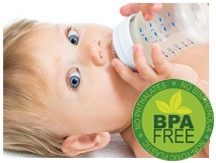BISPHENOL A (BPA)

BISPHENOL-A (BPA)
Bisphenol A (BPA) is a chemical produced in large quantities, primarily, for the use in the production of polycarbonate plastics and epoxy resins.
Polycarbonate plastics have many applications including in the use of some food and drink packaging, e.g., water bottles and infant bottles. Epoxy resins are used as lacquers to coat metal products such as food cans and bottle tops.
- How does BPA get into the body?
- Bisphenol A can leach into food from the protective internal epoxy resin coatings of canned foods and from consumer products such as polycarbonate tableware, food storage containers, water bottles, and infant bottles. The degree to which BPA leaches from polycarbonate bottles into liquid may depend more on the temperature of the liquid or bottle, than the age of the container.
- How can infant bottles exposed to BPA?
-
BPA can transfer from polycarbonate bottles into infant formula as follows:
Surface in infant bottles are scratched or damaged
Pour hot water directly into the infant bottle
- What can I do to prevent exposure to BPA?
-
Some studies suggest that infants and children may be the most vulnerable to the effects of BPA. Parents and caregivers can make the personal choice to reduce exposures of their infants and children to BPA by:
Don’t microwave polycarbonate plastic food containers. Polycarbonate is strong and durable, but over time it may break down from over use at high temperatures.
Plastic containers have recycle codes at the bottom. Some, but not all, plastics that are marked with recycle codes 3 or 7 may be made with BPA.
When possible, option for glass, porcelain or stainless steel containers, particularly for hot food or liquids.
- What action has AEON retail stores taken with regard to BPA?
-
We are committing and concerning about the selling of non-BPA products, especially baby feeding and the products of baby needs. All merchandise sold for baby products in the selling area are non Bisphenol A (BPA) products.
We are currently selling water bottle with non BPA materials. We work with suppliers which strongly encourage to use non-BPA materials for polycarbonate plastic in consumer products for food and beverage containers.
References: National Institute of Environmental Health Sciences (NIEHS), (n.d.). Bisphenol A (BPA). [online] Available at: http://www.niehs.nih.gov/health/topics/agents/sya-bpa/ [Accessed 6 Aug. 2014].
Disclaimer All information provided in our AEON website is provided for information purposes only and is subject to change without prior notice. Since care has been taken to ensure the accuracy, completeness and reliability of the information provided, AEON assumes no responsibility therefore. Our AEON shall not be liable for any direct or indirect damage resulting from, arising out of or in connection with the use of information. In addition to that, for health related topics found on our AEON website should not be used for diagnosing purposes or to be substituted for medical advice.